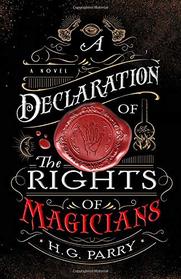A Declaration of the Rights of Magicians by
Review by Cyndi J. (cyndij)
A DECLARATION OF THE RIGHTS OF MAGICIANS by H.G. Parry is one of the “secret history” fantasy genre, dealing with events during the “Age of Enlightenment”, roughly 1780s to 1800-ish, when the freedom of individuals was a hot topic. This is our world, with the same individuals, pretty close to the same system of governments, but with magic underpinnings for many of those in power. You can’t boil down this book to just one theme, but one of the biggest is that individuals have the right to use their magic.
Some individuals are born with magic, and it tends to follow bloodlines. Everyone is tested at birth. If you’re an aristocrat, good for you – you can use your magic and get away with almost anything. If you’re a commoner, you’re out of luck. A magic bracelet identifies you and will burn you unmercifully as well as calling the authorities if you try to use magic, and you’re sent to jail or executed for anything except defending yourself from death.
Slavery is even more horrific than in our timeline. A spellbinding potion is forced down them and from that point on, while their minds rage helplessly inside, their bodies are under complete control of the slavers.
The book follows 3 main narratives: the abolitionist movement in England, with William Pitt the Younger as Britain’s prime minister and his friend William Wilburforce, famous MP and abolitionist; the French Revolution following Maximilien Robespierre; and the slave revolt in the Caribbean, where escaped slave Fina meets up with Toussaint. Except for the slave revolt, this is dense political stuff. Prepare to spend a lot of time reading about votes and meetings and speeches.
In contrast to our world, where it’s only (only) greed and basic inhumanity that make people so awful, this one has a master villain who manipulates the movers and shakers into a design of his choosing. We don’t see this person for a long time, just a voice that comes to Robespierre, but eventually it comes clear that while Robespierre believes the magical help he is receiving is for good, the end results are anything but. And so, England keeps its slave trade, the French Revolution devolves into guillotining everyone in sight, and blood flows across entire islands.
I very much admired how Parry took these real-life events and real people, and incorporated this whole system of magic with a dark design. The characters are vivid, the sense of place and time are perfect, the dialogue is spot on. She achieved a nice ominous overtone in some sections. But frankly, it was glacially slow. Endless political strategies and debate tend to make my eyes glaze over, and the slave sub-plot just made me unbearably sad. Then, too, knowing that the broad events were real without the excuse of a demonic villain also made me sad. This isn’t light fare: despite the law abolishing the slave trade and the overthrow of the French monarchy, there’s no joy.
My other disappointment happened about halfway through when I realized that the story is not contained in one book. No payoff – we have only vague ideas who the villain is and there is no confrontation with it. The meager victories are not celebrated, it’s just a grim ending. The next one is obviously the Napoleonic empire, and I’m curious how Parry will deal with it, but by the last quarter of this novel I was really ready for it to be over.
Tags: Book Reviews, Book Suggestions


